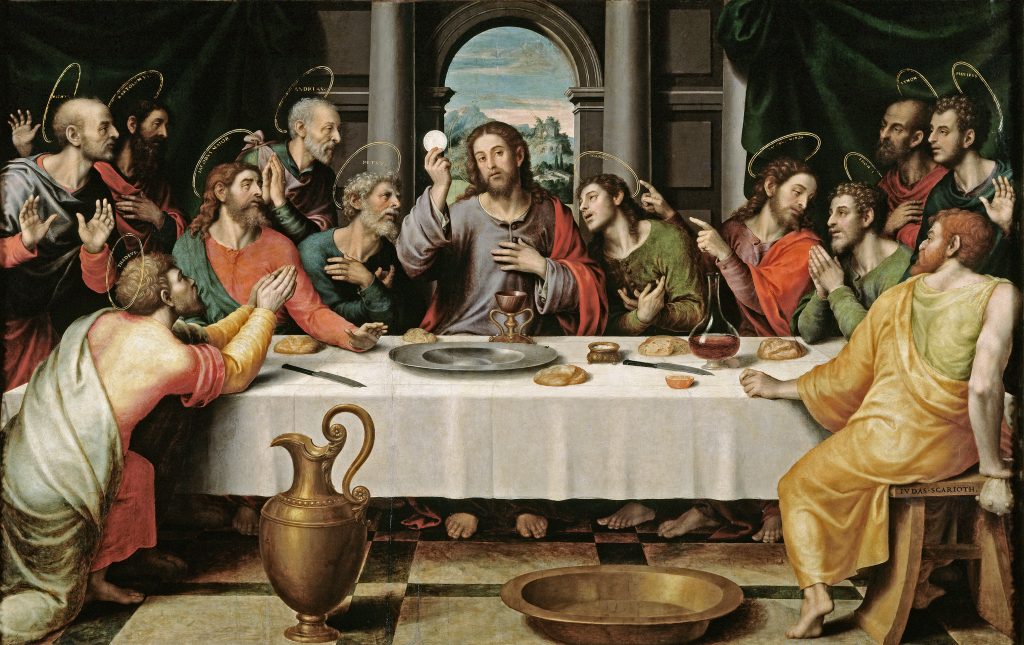
Lesson Objectives
- To finish reading the Old Testament (from Joshua to Malachi) and to read with understanding.
- To understand the broad outlines of the history of Israel in light of God’s covenant with Abraham.
- To appreciate the crucial importance of God’s everlasting covenant with David.
I. Review and Overview
With this lesson we reach the summit of the Old Testament - God's promise of an everlasting Kingdom to David.
As we will see, the covenant with David is in the near background of every page of the rest of the Bible - indeed, until into the last page of the Book of Revelation, where Jesus reveals that He is "the root and offspring of David," promised in the covenant (see Revelation 22:16).
It will be useful, then, before we consider the Davidic Covenant, to try to summarize what we've been trying to accomplish in this course.
We've said that the story of the Bible is a history of salvation - of God's desire and plan to bestow His blessing, the gift of His divine life, on all creation.
As The Catechism of the Catholic Church puts it: "From the beginning until the end of time the whole of God's work is a blessing. From the liturgical poem of the first creation to the canticles of the heavenly Jerusalem, the inspired authors proclaim the plan of salvation as one vast divine blessing" (see no. 1079).
As it unfolds in the words of the inspired authors, God's plan of salvation, His work of blessing, unfolds in a sequence of covenants.
The premise of this course is that in studying these covenants we enter into the heart of the "biblical worldview" - the way God intends us to understand the history and destiny of the world and our individual lives (see "The Covenant Principle: Testimony from Scripture and Tradition" in our first lesson).
Put another way: The covenants reveal who God is, who we are, the meaning of our individual lives, and the destiny of our lives together as members of the human race. God relates to His people - the whole human race - and to each one of us, individually, by means of covenant.
This premise is reflected even in the division of the Bible into "old" and "new" testaments, a word that means covenant.
We have identified five covenants in the Old Testament - with Adam and creation, with Noah, with Abraham and his seed, with Moses and Israel, and finally, with David and the Kingdom of all Israel.
In a sense, these covenants are all aspects of a single covenant - what the prophet Daniel calls God's "merciful covenant" (see Daniel 9:4,27; 11:30,32), what the Bible's last book calls the "everlasting good news [gospel] to...those who dwell on earth, to every nation, tribe, tongue and people" (see Revelation 14:6).
The covenant begins with the blessing of all living beings, and especially Adam and Eve (see Genesis 1:28), the representatives of the human race. This covenant is renewed in the covenant with Noah (see Genesis 6:18, 9:9,11).
With Abraham the covenant is given a historical focus, a trajectory that points it toward a future in which all nations will be blessed (see Genesis 17:2,4,7). The covenant with Israel is made to fulfill God's "holy word to His servant Abraham" (see Psalm 105:8-12,42). And as we'll see in this lesson, God's covenant with David is made to renew and fulfill the promise to Abraham.
What is God's purpose with His covenant? To bless the human race, transforming it into a single family of God, to make each individual what Adam was intended to be - a son of God the Most High, heir to the kingdom of heaven, a ruler of creation, a "priest" who sees his or her life as a work of worship and thanksgiving, a sacrifice of praise.
The language of the covenant in the Old Testament is "marital" or "nuptial" - God swears Himself to be the people's God and the people swear to be His people (see Leviticus 26:12;Deuteronomy 29:12).
Like marriage vows in the human sphere, the Bible's covenants create a family.
We see this from the very start - Adam and Eve are to "fill the earth" with their children (seeGenesis 1:27). This mandate is renewed in the covenant with Noah (see Genesis 9:1,9). Likewise, Abraham is called to be "the father of a host of nations" (see Genesis 17:4;22:17-18). By His covenant with Moses, God established Israel as His "first-born son" through whom all the peoples of the world would be blessed (see Exodus 4:22).
The covenant unions God establishes are meant to extend His blessings, His family to the ends of the earth. All this comes into sharp focus with the story of the Davidic Kingdom.
But before we consider the Kingdom, we need to pick up where we left off in the story of our salvation.
Other Lessons
- Lesson One: The Master Key that Unlocks the Bible
- To learn the "big-picture" overview of the Bible - the story that the Bible tells.
- To understand the concept of "covenant" and its importance for reading and interpreting the Bible.
- To learn in general detail the six major covenants in the Bible.
- Lesson Two: From Sabbath to Flood
- To read Genesis 1-12 with understanding.
- To learn the meaning of the first two covenants of salvation history - the Sabbath, and the covenant made with Noah.
- To begin to understand the "patterns" of biblical history.
- Lesson Three: Our Father, Abraham
- To read Genesis 12-50 with understanding.
- To understand God’s covenant with Abraham and to see how that covenant is fulfilled in the New Covenant of Jesus Christ.
- To appreciate key figures and elements in the Abraham story - Melchizedek, circumcision, the sacrifice of Isaac - as they are interpreted in the Church’s tradition.
- Lesson Four: The First-Born Son of God
- To read the Books of Exodus, Leviticus, Numbers, and Deuteronomy with understanding.
- To understand God’s covenant with Israel at Sinai and to see how this covenant looks forward to and is fulfilled in the New Covenant of Jesus Christ.
- To appreciate the key figures and events - Moses, the Passover, and the vocation of Israel as “a kingdom of priests” - as they are interpreted in the Church’s tradition.
- Lesson Six: The New and Everlasting Covenant
- To read the New Testament with understanding.
- To understand how the New Testament depicts Jesus as the fulfillment of the covenants of the Old Testament.
- To appreciate, especially, the importance of God’s everlasting covenant with David for understanding the mission of Jesus and the Church as it is presented in the New Testament.

